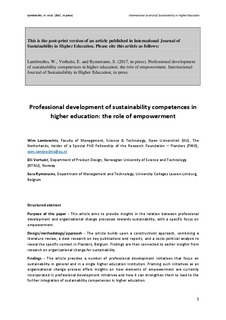| dc.contributor.author | Lambrechts, Wim | |
| dc.contributor.author | Verhulst, Elli | |
| dc.contributor.author | Rymenams, Sara | |
| dc.date.accessioned | 2017-08-03T07:05:11Z | |
| dc.date.available | 2017-08-03T07:05:11Z | |
| dc.date.created | 2016-08-31T11:15:44Z | |
| dc.date.issued | 2017 | |
| dc.identifier.citation | International Journal of Sustainability in Higher Education. 2017, 18 (5), 697-714. | nb_NO |
| dc.identifier.issn | 1467-6370 | |
| dc.identifier.uri | http://hdl.handle.net/11250/2449780 | |
| dc.description.abstract | Purpose This paper aims to provide insights into the relation between professional development (PD) and organisational change processes towards sustainability, with a specific focus on empowerment. Design/methodology/approach The paper builds upon a constructivist approach, combining a literature review, a desk research on key publications and reports and a socio-political analysis to reveal the specific context in Flanders, Belgium. Findings are then connected to earlier insights from research on organisational change for sustainability. Findings The paper provides a number of PD initiatives that focus on sustainability in general and in a single higher education (HE) institution. Framing such initiatives as an organisational change process offers insights on how elements of empowerment are currently incorporated in PD initiatives and how it can strengthen them to lead to the further integration of sustainability competences in HE. Research limitations/implications Limitations are linked with the kind of sources used in the constructivist approach. The analysis only looks at written reports on the topic, albeit it also builds upon the first-hand experiences of educators in the HE institution focused upon in the case. Practical implications There is a need to frame PD initiatives as an organisational change process towards sustainability with specific attention towards empowerment. Without this framing, PD approaches comprise the risk of being left in the margins or being understood as single initiatives without any connection to the bigger picture, i.e. the transition towards sustainability in HE. Social implications Interlinking PD and organisational change provides opportunities to frame the sustainability transition within the university in a wider societal context. Originality/value The paper provides an original contribution to the debate on sustainability competences, as it frames the PD within an organisational context, rather than focusing on the individual role of educators. | nb_NO |
| dc.language.iso | eng | nb_NO |
| dc.publisher | Emerald | nb_NO |
| dc.relation.uri | http://www.emeraldinsight.com/doi/full/10.1108/IJSHE-02-2016-0028 | |
| dc.title | Professional development of sustainability competences in higher education: the role of empowerment | nb_NO |
| dc.type | Journal article | nb_NO |
| dc.type | Peer reviewed | nb_NO |
| dc.description.version | acceptedVersion | nb_NO |
| dc.source.pagenumber | 697-714 | nb_NO |
| dc.source.volume | 18 | nb_NO |
| dc.source.journal | International Journal of Sustainability in Higher Education | nb_NO |
| dc.source.issue | 5 | nb_NO |
| dc.identifier.doi | 10.1108/IJSHE-02-2016-0028 | |
| dc.identifier.cristin | 1376879 | |
| dc.description.localcode | © Emerald Publishing Limited 2017. This is the authors' accepted and refereed manuscript to the article. Locked until 31.07.2019 due to copyright restrictions | nb_NO |
| cristin.unitcode | 194,64,30,0 | |
| cristin.unitname | Institutt for produktdesign | |
| cristin.ispublished | true | |
| cristin.fulltext | postprint | |
| cristin.qualitycode | 1 | |
